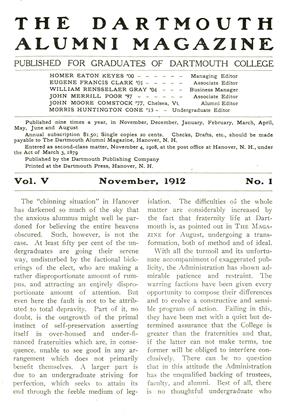Some Dartmouth readers of the Review of Reviews may have been somewhat disturbed to read in the September number of that periodical, in an article by Joseph Ellner, entitled "Working One's Way Through College," the following statement:
"When, however, there are more men than jobs, the college man must invent work. This is especially true of Princeton which has as many students as anyother three small-town colleges combined."
Among the other small-town colleges mentioned was Dartmouth, hence the implication that Princeton is twice Dartmouth's size. At any rate, the article caught the watchful eye of Joseph W. Gannon '99, who forthwith called the attention of the editor of the Review of Reviews to some errors of fact in Mr. Ellner's article and presented the statistics of entering classes at Dartmouth and Princeton during the last four years, as follows:
1907-8 1908-9 1909-10 1910-11 Total Princeton 328 347 362 394=1431 Dartmouth 357 334 309 426=1426
Mr. Gannon has forwarded to THE MAGAZINE the editorial reply, which is interesting both as a model of courteous apology and as an amusing sidelight upon the tribulations of a sanctum.
NEW YORK CITY:
DEAR SIR:
Your letter of September 3 referring to a statement in Mr. Joseph Ellners article on "Working One's Way Through College," in the September Review of Reviews, has been referred to Mr. Ellner, who is mortified by the fact that this error relating to the comparative size of Princeton and Dartmouth slipped into the statement, but says that it is his recollection that Dartmouth was specifically excepted in the first draft of the article, and in the course of condensing the manuscript this necessary qualification seems to have been dropped. In any event, the statement could not have been true excepting as regards the particular colleges mentioned by Mr. Ellner in the article. There are, of course, other small town colleges larger than either Princeton or Dartmouth. I am at a loss to explain how this obvious error passed both copy and proof readers, but it was one of the mysterious things that are always happening in newspaper and magazine offices, the reason for which is beyond human ken. It seems hardly probable that so glaring a mistake can mislead any great number of readers. If it does we shall sincerely regret it, for we took pains to have the manuscript read by outside authorities for the very purpose of securing accuracy of statement. I thank you for calling our attention to the matter.
 View Full Issue
View Full Issue
More From This Issue
JOSEPH W. GANNON
-
 Class Notes
Class Notes1899
April 1946 By JOSEPH W. GANNON, EDWARD R. SKINNER -
 Class Notes
Class Notes1899
April 1953 By JOSEPH W. GANNON, PHILIP H. WINCHESTER -
 Class Notes
Class Notes1899
February 1961 By KENNETH BEAL, JOSEPH W. GANNON -
 Class Notes
Class Notes1899
OCTOBER 1966 By KENNETH BEAL, JOSEPH W. GANNON -
 Class Notes
Class Notes1899
December 1955 By PHILIP H. WINCHESTER, EDWARD R. SKINNER, JOSEPH W. GANNON -
 Class Notes
Class Notes1899
November 1956 By PHILIP H. WINCHESTER, EDWARD R. SKINNER, JOSEPH W. GANNON













